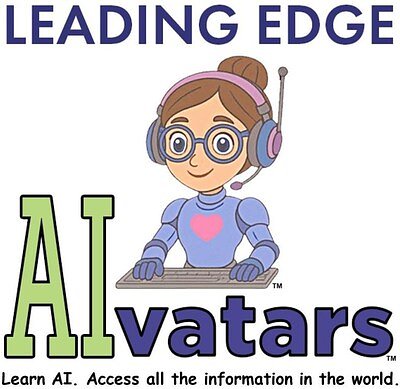
AI Education Bridging Digital Divide: New Course Targets Tech-Averse Adults
A new course is launching to help adults overcome their fear of AI, providing practical skills for everyday life. The program also offers free access to veterans, expanding digital literacy.
AI Education Bridging Digital Divide: New Course Targets Tech-Averse Adults
NEW YORK, NY – November 17, 2025 – As artificial intelligence rapidly integrates into daily life, a growing number of adults find themselves feeling left behind, intimidated by the technology and unsure of how to harness its potential. Leading Edge AIvatars is launching a new initiative, 'AI for the Curious, Confused, and Tech-Phobic,' aimed at addressing this digital divide with a uniquely accessible approach to AI education.
Addressing a Growing Need for AI Literacy
The course, a three-night live, interactive Zoom seminar and accompanying eight-hour recorded video, isn't about coding or complex algorithms. It’s designed for individuals with little to no technical experience, focusing on practical applications of AI in everyday tasks – from understanding medical test results and managing paperwork to planning travel and improving communication. The program's founders recognized a significant gap in the market for AI education that prioritized usability and demystification over technical proficiency.
“We see a lot of AI courses geared towards professionals or those already comfortable with technology,” explains one of the co-founders. “But there's a huge segment of the population – particularly those who didn't grow up with computers – who are genuinely apprehensive and need a gentle, supportive introduction. They’re not looking to build AI, they want to use it.”
This sentiment echoes a wider trend. While discussions around AI often focus on its potential impact on the job market and the economy, less attention is paid to the basic digital literacy required to navigate an increasingly AI-powered world. Many adults worry about being overwhelmed by technology and losing control over their personal information, creating a psychological barrier to adoption. The course seeks to alleviate these fears by framing AI as a tool that can simplify their lives, not complicate them.
A Business Built on Accessibility
Leading Edge AIvatars, co-founded by Debbie Kahn, daughter of futurist Herman Kahn, and Barri Shane, a former Program Director at The Learning Annex, aims to democratize AI education. Kahn’s lineage in future studies brings a unique perspective on technological shifts, while Shane’s experience in adult education underscores the importance of accessible learning. The company's business model revolves around providing high-quality, practical training at a competitive price point. The live course is offered at an introductory rate of $149, while the recorded video is available for $99.
“The Learning Annex was all about making education available to everyone, regardless of their background or experience,” Shane shares. “We’re applying that same philosophy to AI. We believe that everyone deserves the opportunity to understand and benefit from this technology.”
Analysts suggest that this focus on accessibility could be a key differentiator in a rapidly growing market. While many online learning platforms offer introductory AI courses, few specifically target the “tech-phobic” demographic or offer the live, interactive format that Leading Edge AIvatars provides. The company's emphasis on practical application also sets it apart from more theoretical or technically focused courses.
Expanding Digital Inclusion for Veterans
Perhaps the most notable aspect of Leading Edge AIvatars' initiative is its commitment to providing free access to the recorded video course for all 16.5 million U.S. veterans. This initiative, born from a desire to give back and support those who have served, has garnered widespread praise.
“We believe that veterans could particularly benefit from AI literacy, both in their personal lives and in their transition to civilian careers,” says Kahn. “AI skills can open up new opportunities in fields like data analysis, customer service, and cybersecurity.”
The decision to offer a free course to veterans is not only a socially responsible gesture but also a smart business move. It expands the company’s reach, builds brand loyalty, and reinforces its commitment to inclusivity. Experts suggest this initiative could serve as a model for other companies seeking to bridge the digital divide and empower underserved communities.
One veteran shared, “I’ve been hesitant about getting into AI, it seemed too complicated. But knowing there’s a course specifically designed for people like me, and that it’s free, makes it much more approachable. It's nice to feel like someone is thinking about us.”
The company believes providing veterans access to AI education is not simply about teaching them a new skill but also about honoring their service and equipping them for success in the 21st century.
